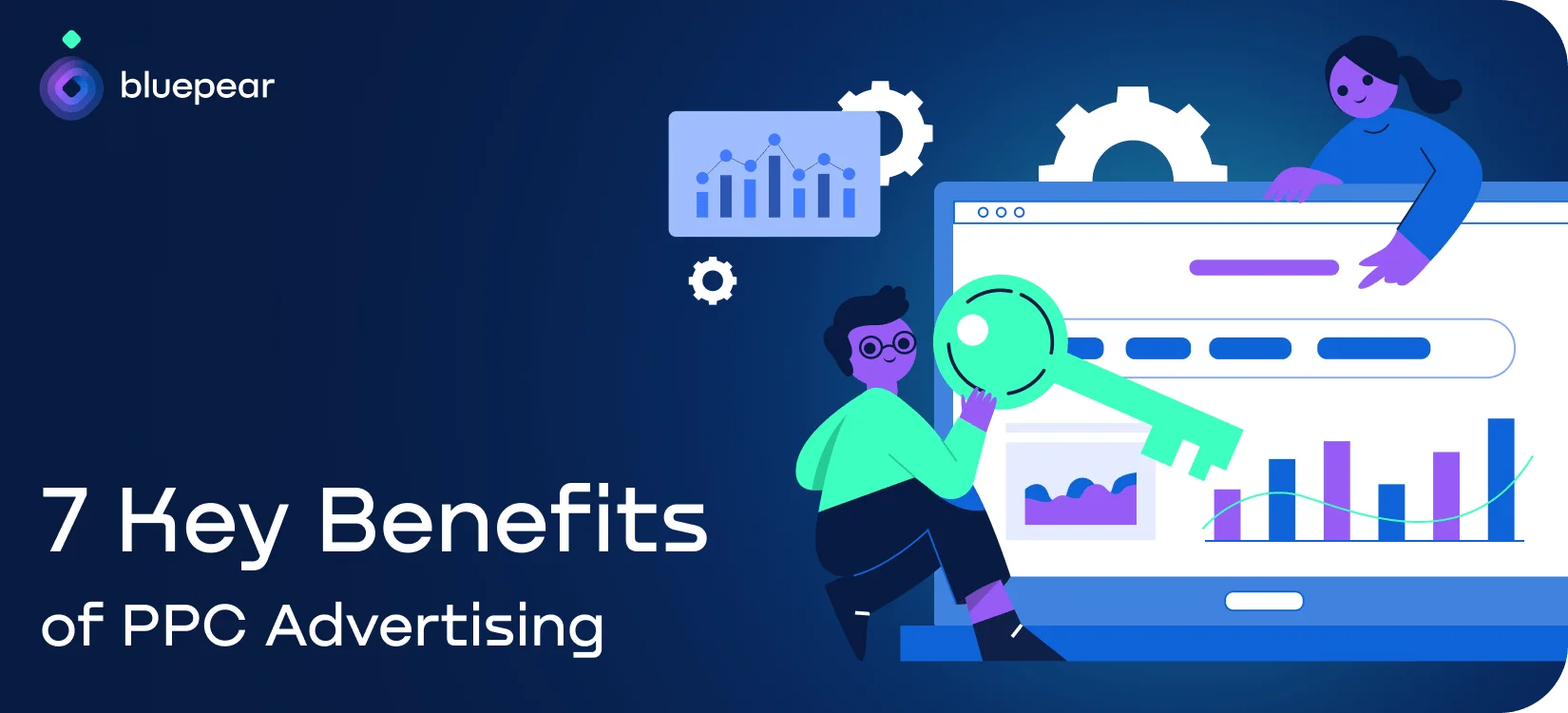
Contents
Benefits of PPC (Pay-Per-Click) advertising have emerged as a game-changing approach for companies looking to enhance their online visibility and drive targeted traffic.
Pay-per-click (PPC) advertising is a digital marketing method where you pay only when someone clicks on your ad. It’s more targeted and efficient than traditional marketing, helping businesses connect directly with their ideal customers.
We'll look at seven key benefits of PPC advertising that show why it’s a valuable tool for businesses aiming for growth, engagement, and measurable results in the digital world.

1. Strategic Business Growth Through PPC
The benefits of PPC go beyond basic ad placement, changing how businesses approach online marketing. In today’s competitive digital world, PPC helps companies boost revenue and reach more customers. Key business objectives supported by PPC:
• Immediate lead generation
• Direct sales conversion
• Brand awareness expansion
• Market penetration
• Targeted audience engagement
PPC helps businesses match their marketing efforts to specific goals. Whether it’s launching a product, reaching a new audience, or boosting revenue, PPC campaigns can be tailored for clear results.
2. Advanced user journey tracking and analytics
PPC changes how businesses connect with their audience by offering detailed tracking and analytics. Modern platforms provide valuable insights into user behavior, turning data into actionable marketing strategies.
User activity tracking Capabilities:
• Click-through path analysis
• Conversion funnel visualization
• User interaction heat mapping
• Multi-channel attribution modeling
• Detailed engagement metrics
Pay-per-click advantages enable marketers to follow potential customers through every stage of their digital journey, from initial ad impression to final conversion. This allows businesses to understand precisely how users interact with their marketing materials, offering insights that were previously impossible to obtain.
3. Rapid market entry and immediate visibility
PPC provides businesses with an unparalleled opportunity for instant market penetration. Unlike traditional marketing channels that require months of preparation, pay-per-click advertising enables companies to launch targeted campaigns within hours.
Quick Market Entry Strategies:
• Immediate search engine placement
• Rapid campaign deployment
• Instant audience targeting
• Flexible ad content modifications
Pay-per-click advantages eliminate traditional barriers to digital marketing, allowing even small businesses to compete with larger competitors in the digital world.
4. Unprecedented Campaign Customization
PPC offers marketers extraordinary control over their advertising efforts. Businesses can fine-tune every aspect of their campaigns with remarkable precision.
Campaign Customization Options:
• Budget-level control
• Granular targeting
• Ad scheduling
• Keyword optimization
Benefits of pay-per-click include the ability to:
• Adjust campaigns in real-time
• Target specific audience segments
• Control daily spending
• Pause and restart campaigns instantly
5. Seamless multi-channel marketing integration
Modern marketing requires a well-rounded approach, and PPC offers the flexibility to enhance campaigns across different channels. By strategically aligning PPC with SEO, social media, and content marketing, businesses can create a cohesive brand message that connects with their audience.
The benefits of pay-per-click become particularly evident in cross-channel marketing strategies. For instance, PPC campaigns can support content marketing by driving traffic to high-value blog posts, while simultaneously reinforcing social media messaging and providing additional touchpoints for potential customers. This integrated approach ensures that marketing efforts work in concert, maximizing overall campaign effectiveness and creating multiple opportunities for customer engagement.
6. Targeted audience engagement
PPC offers a major benefit in audience targeting. Unlike traditional advertising, it allows businesses to reach specific customer groups with unmatched precision.
Key audience targeting features:
• Demographic precision targeting
• Behavioral pattern recognition
• Geographic location specificity
• Device-specific audience segmentation
• Intent-based targeting mechanisms
Modern PPC technologies enable marketers to drill down into incredibly specific audience characteristics, including demographic details, behavioral patterns, geographic locations, and even precise interest profiles. This level of targeting transforms digital advertising from a scattershot approach to a surgical marketing instrument.
7. Comprehensive Marketing Intelligence
PPC enables businesses to collect and analyze comprehensive data that offers insights into consumer behavior, market trends, and competitive landscapes. This wealth of information becomes a strategic asset, allowing companies to make informed decisions that drive long-term marketing success.
Key Marketing Intelligence Areas:
• In-depth performance analysis
• Mapping consumer behavior
• Competitive landscape analysis
• Predicting marketing trends
• Identifying real-time market trends
PPC offers marketers a detailed view of audience interactions, enabling ongoing improvement of marketing strategies. By tracking clicks, impressions, and conversions, businesses can refine their approaches to customer engagement.
Conclusion
As we've explored the seven critical advantages of pay-per-click, it becomes clear that PPC is far more than just an advertising tool. It’s a comprehensive digital marketing approach that helps businesses connect with their audience in precise and effective ways.
The advantages of PPC go beyond traditional marketing, giving businesses of all sizes the opportunity to compete and grow in a digital world. From quick market entry to advanced targeting, and from seamless multi-channel integration to valuable marketing insights, PPC has become an essential strategy for modern businesses.

